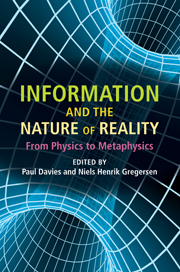5 - The computational universe
from Part II - Physics
Published online by Cambridge University Press: 06 December 2010
Summary
It is no secret that we are in the midst of an information-processing revolution based on electronic computers and optical communication systems. This revolution has transformed work, education, and thought, and has affected the life of every person on Earth.
THE INFORMATION-PROCESSING REVOLUTIONS
The effect of the digital revolution on humanity as a whole, however, pales when compared with the effect of the previous information-processing revolution: the invention of moveable type. The invention of the printing press was an information-processing revolution of the first magnitude. Moveable type allowed the information in each book, once accessible only to the few people who possessed the book's hand-copied text, to be accessible to thousands or millions of people. The resulting widespread literacy and dissemination of information completely transformed society. Access to the written word empowered individuals not only in their intellectual lives, but in their economic, legal, and religious lives as well.
Similarly, the effect of the printed word is small when compared with the effect of the written word. Writing – the discovery that spoken sounds could be put into correspondence with marks on clay, stone, or paper – was a huge information-processing revolution. The existence of complicated, hierarchical societies with extended division of labor depends crucially on writing. Tax records figure heavily in the earliest cuneiform tablets.
Just as printing is based on writing, writing stems from one of the greatest information-processing revolutions in the history of our planet: the development of the spoken word.
- Type
- Chapter
- Information
- Information and the Nature of RealityFrom Physics to Metaphysics, pp. 92 - 103Publisher: Cambridge University PressPrint publication year: 2010
References
- 5
- Cited by

